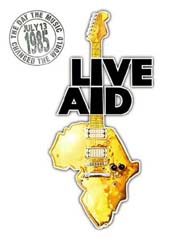Note: (June 30th, 2005): Somali-Canadian rapper K'naan, DMC (of Run-DMC), and the African Guitar Summit crew have joined the lineup of artists for Live 8 in Barrie on July 2nd.
|
Well, here we go again... Twenty years after Live Aid, Bob Geldof presents his latest “Save Africa project”: Live 8. Live 8 is a series of concerts to be held in London, Rome, Philadelphia, Paris, Berlin, and Toronto to generate awareness of the problem of Third World debt in general and the plight of Africa in particular. These concerts will be held just days before the meeting of the G8 leaders in Scotland. Hence the name: Live 8. Many big names in the music industry are scheduled to perform, including Jay-Z and P. Diddy in Philadelphia and Angelique Kidjo, U2, R.E.M., and Lauryn Hill in London. |
 |
The Canadian concert will take place at Molson Park in Barrie on July 2nd and will feature, among many others, The Tragically Hip, Gordon Lightfoot, Sam Roberts, Tom Cochrane and The Barenaked Ladies. As you’ve noticed, there are no black or brown faces in that lineup; that is for an event that the organizers hope will ultimately benefit the African continent. Perhaps no African-Canadian artists were contacted. Perhaps none were available. Who knows. Their absence is certainly peculiar.
In Geldof's words, Live 8 “isn't about charity; it's about justice. “These concerts are the starting point for The Long Walk To Justice, the one way we can all make our voices heard in unison.”
Right.
One is almost tempted to ask: Wasn’t that what Live Aid was also meant to do 20 years ago? Has there been an improvement in the overall economic standing of the African continent as a direct result of that event?
Africa doesn’t need aid to solve its problems. For the most part, African countries are rich, both in resources and in the capacity of their populations. In the words of Naomi Klein, writing recently in The Nation Magazine, “Sub-Saharan Africa, the poorest place on earth, is also its most profitable investment destination. Africa is poor because its investors and its creditors are so unspeakably rich.”
What Africa requires is some fairness in trade and economic relationships and a modicum of recognition of the wrongs of the past that still haunt it.
 |
I wrote an article on this subject three years ago, providing the historical context for the current state of the continent and the reasons it finds itself in debt to the West today. I will simply refer you to it for background. (See The Problem With Aid) Live 8 is a nice gesture in a recent series of nice gestures regarding aid and debt relief: Tony Blair’s 10-year, $25 billion British plan to double aid to the poorest African nations and The G8 Finance Ministers' recent cancellation of about $40 billion in debt owed by the world’s 18 poorest nations, 15 of which are in Africa. |
Ultimately, Live 8 will not change the status quo for the following reasons:
I-It is centred on the spectacle.
II-It fails to properly convey to the public the intricate web of consultants, contracts and borrowing rules that keep Africa poor.
Music fans going to Park Place in Barrie on July 2nd will not be told, for instance, about an organization called The Paris Club (www.clubdeparis.org): a consortium of mostly Western creditors that receives billions of dollars a year from African countries in debt repayment, close to 37% of national revenues from an already impoverished country like The Democratic Republic of Congo. That same organization forbids debtors from negotiating as groups of countries (to get a better interest rate or repayment plan on their loans) while the lenders retain that privilege.
The Paris Club and many other lending entities, such as Export Credit Agencies (EDC here in Canada), also exclusively provide loans in Canadian, US dollars, or Euros. When their currencies are devalued, African countries are liable for close to twice their original loan amounts. My native country of Cameroon ended up in this situation after the devaluation of the CFA Franc in January 1994.
III-It fails to highlight the hypocrisy of the aid packages (coming on the heels of centuries of slavery and colonization) that, even at a lowly target of .7% of the rich countries' GDP, has only been met so far by a few countries such as Sweden and Norway since it was instituted.
IV-It does not detail the Western world’s trade and other economic policies that greatly contribute to impoverishing Africa. From the neo-liberal recommendations of the IMF and the World Bank (privatization, dropping of tariffs on Western-manufactured goods, opening-up of African economies to foreign ownership, etc…) to the continuous subsidies provided to Western farmers, to the calculated robbery done through the support of corrupt leaders and crony deals (J.D. Mobutu and the Belgian diamond companies in Congo, Sani Abacha and Shell in Nigeria, Omar Bongo and France’s ElfTotalFina in Gabon, to name a few).
V-It finally absolves us here in the West of any direct wrongdoing in the current plight of Africa and the Third World in general. The whole thing, after all, is presented as a sympathy show: we, the rich, show that we are not the selfish, shallow, materialistic individuals that our spending habits display to the rest of the world.
So, if seeing Sam Roberts or Gordon Lightfoot on stage is your idea of a great show, drive up to Barrie on July 2nd. But remember to bring a good book along just in case. Why not Noreena Hertz’s The Debt Threat: How Debt is Destroying the Developing World?

